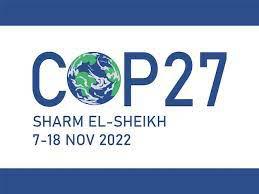COP27 should make headway on climate finance and loss and damage: TERI delegation to Sharm el-Sheikh

New Delhi, November 03, 2022: With the 27th session of the Conference of Parties (COP) opening at Sharm el-Sheikh in Egypt over the weekend, the delegation from the New Delhi-based The Energy and Resources Institute (TERI) to the session underscored the need for the global climate negotiations to adopt a people-centric approach, and make headway on long-standing issues of climate finance and loss and damage.
With the ongoing Russia-Ukraine situation and the energy crisis in Europe compounding the woes of world that has been wreaked by extreme weather events and its devastating impacts, particularly in the developing world, the delegates noted that COP27 should be resolving issues related to enhanced transparency framework, mobilization of long-term climate finance, adequacy of mitigation commitments by the Parties, the Global Goal on Adaptation, implementation of Article 6 (market-based mechanisms), the Warsaw international mechanism for loss and damage, and the implementation of gender-responsive climate actions.
The delegation will be part of an array of events and be engaged with them in diverse capacities -- as organizer, co-organizer and panellist; and will discuss issues of decarbonization pathways, vulnerability and adaptation, technological change, climate governance, climate finance and enhanced transparency.
The delegation of 19 people will be headed by Dr Vibha Dhawan, Director General, TERI. “Considering the particularly fraught world in which COP 27 is set to unfold, and the continuing and devastating impacts of extreme weather events felt across the globe, it is imperative that the session at Sharm el-Sheikh engages with and tries to resolve issues related to long-term climate finance and the mechanisms for loss and damage,” said Dr Dhawan.
Pointing out that any consensus on an enhanced scale of financial mobilization could be a welcome takeaway from COP27, Mr RR Rashmi, Distinguished Fellow, TERI, and former climate negotiator under the United Nations Framework Convention on Climate Change (UNFCCC), observed, “There has been a great degree of resistance and difference on this issue. A consensus on the need to scale up the level of financing mobilization will be a great achievement.” Mr Rashmi noted that the figure of 100 billion USD for developing countries was agreed upon much before the Paris Agreement was signed. “Based on the Nationally determined contributions (NDCs), there is a needs assessment report published by the UNFCCC which says the total cumulative financing requirements of the developing world is anything in the range of 5.8-5.9 trillion USD till 2030. We should be able to agree on an enhanced scale of requirement.”
Ms Suruchi Bhadwal, Senior Fellow and Director, Earth Science and Climate Change Division, highlighted the crucial role Sharm el-Sheikh could play for the Global Goal on Adaptation. “The COP in Egypt is a reminder for providing a thrust to adaptation and discussion on its goals and contributions for the Global Stocktake.”
Drawing attention to the focus on nature and ecosystem-based solutions at COP27, Dr JV Sharma, Senior Director, Land Resources Division, said, “India voluntarily communicated to achieve additional sequestration of 2.5-3 billion tons of e Co2 through additional forest and tree cover by 2030. On the basis of baseline year as 2005 and the analysis of Forest Survey of India, the country will overachieve its target by 1.25 billion tons of e Co2. India has the large potential to enhance income of farmers for their efforts made under agroforestry through carbon finance mechanism, and also uplifting the economic status of forest dependent communities through carbon finance mechanism under a conservation approach.”
Ahead of COP27, Dr Shailly Kedia, Senior Fellow and Associate Director, Sustainable Development and Outreach Division, emphasized the need for a shift in the approach of climate negotiations. “A paradigm shift in the climate regime is needed. There is a need to re-define vulnerability and move away from a country-centric approach to a people-centric approach in climate negotiations.”
With the session envisioned to be an implementation COP, Dr Kedia added, “In terms of implementation, the global climate regime must benefit vulnerable people and not just vulnerable countries. Policy initiatives need to be supplemented by people-centric mass movements such as Lifestyle for Environment (LiFE) campaign of India.”
Dr Manish Shrivastava, Senior Fellow, Earth Science and Climate Change Division, said the upcoming COP in Egypt should set the record straight on Just Energy Transition Partnerships where G7 countries are offering financial partnerships with developing countries. “What does it mean for international governance of climate finance? It has to be set clear at COP as it has very important power implications,” he said.
Noting that Sharm el-Sheikh is a platform that will bring multiple stakeholders together, Mr Arupendra Nath Mullick, Fellow, Council for Business Sustainability, said, “It is important to create a case for an inclusive approach to engage both the supply and demand side, as well as the financial aspects for the transition of hard-to-abate sectors of cement, iron and steel. The time for action is now.”
The events TERI will be engaged with at COP27 are spread across the fortnight of the session. To find out about TERI’s presence at COP27, click here: https://www.teriin.org/teri-at-cop27
Ahead of COP27, TERI has also launched its podcast – The Earth Pod – and the first episode is on ‘What to Expect from COP27’. Listen to the podcast here: https://spoti.fi/3DSMOHj
About TERI
The Energy and Resources Institute (TERI), based in India, is an independent, multi- dimensional research organization with capabilities in policy research, technology development, and implementation. An innovator and agent of change in the energy, environment, climate change and sustainability space, TERI has pioneered conversations and action in these areas for nearly five decades. Headquartered in New Delhi, it has centres in six Indian cities, and is supported by a multi-disciplinary team of scientists, sociologists, economists, engineers, administrative professional and state-of-the-art infrastructure.

